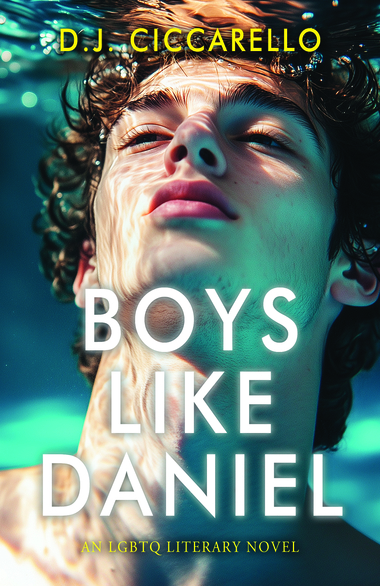"Boys Like Daniel"

- by Jack Chandler
Entertainment Writer
D.J. Ciccarello’s Boys Like Daniel is an elegantly restrained portrait of longing, regret, and the uneasy reconciliation between two young friends, who they were and who they became. It transforms what might have been a simple reunion narrative into something far more psychologically rich.
Set in Atlanta in 1986, the novel follows Daniel Whitmire, a 24-year-old man living openly gay yet emotionally adrift. He flows through hookups, bars, and fleeting encounters, convincing himself that liberation equals satisfaction.
When he unexpectedly crosses paths with Kevin, the friend and first love he fled four years earlier, his detachment begins to crack. The encounter awakens memories and remorse that pulse through the novel like a refrain: not just the loss of a person, but the loss of an unguarded self.
Ciccarello’s prose is vivid and cinematic, often evoking a sense of memory rendered in motion. His use of the first-person present tense keeps readers anchored in Daniel’s restless psychology: raw, self-aware, and sometimes painfully honest.
Scenes are staged with visual precision: the mirror and cleansing of water, the hush of late-night streets, the hollow intimacy of anonymous encounters. Each image thematically reflects Daniel’s oscillation between desire and self-disgust. The author’s writing is sensual but restrained, elegiac without self-pity, and his handling of sexuality feels purposeful, depicting physical acts not for shock or titillation, but as reflections of emotional absence or connection.
The result is a story about memory, identity, and the painful beauty of becoming whole.
One reviewer likened Daniel to Barrymore’s Dr. Jekyll and Mr. Hyde, a man split between two selves. It’s an apt comparison. Daniel inhabits both the hardened, jaded nightlife regular and the boy who still dreams of being seen and forgiven. That tension drives every page. Ciccarello refuses easy absolution; his protagonist’s journey is not one of rekindled romance, but rather toward recognition. The author’s refusal to take the easy off-ramps gives the novel its moral and emotional authority.
What sets Boys Like Daniel apart from many LGBTQ+ coming-of-age novels is its refusal to tidy up. There is no formulaic redemption, no cinematic reunion. Instead, readers are offered something rarer: genuine closure. Daniel’s enlightenment comes not through reclaiming a lost lover but through seeing himself clearly for the first time.
The book’s closing chapters offer stillness, not triumph—a quiet acceptance that feels both earned and deeply human.
Ciccarello’s supporting characters amplify the emotional resonance. Josh, Kevin’s steady partner, is rendered with remarkable empathy; Patrick, a younger temptation, becomes a mirror for Daniel’s self-deception; and Naomi and Mateo, his Atlanta friends, provide the chorus of realism he resists hearing. Each serves to challenge Daniel’s illusion that desire alone can fill the spaces regret carved out.
The result is a novel that hums with introspection. It’s sensual without being erotic, melancholy without despair. Like a vinyl record played too many times, Boys Like Daniel carries the crackle of memory and the warmth of something handmade: imperfect, human, and profoundly felt. Ciccarello composes not a love story but a requiem for what might have been, and in doing so, finds unexpected grace.
Verdict: A powerful 5-Star, introspective work that stands as one of those rare works that speaks to more than its genre. Thoughtful, emotionally unflinching, and exquisitely written, it lingers like the final note of a favorite song: unfinished, unresolved, and unforgettable. It’s no wonder the novel was awarded Amazon’s “#1 New Release in LGBTQ+ Classic Fiction” status during its first week of release.
The Gayly online. 11/18/2025 @ 12:22 p.m. CST.





